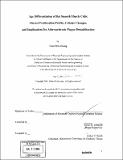Age differentiation of rat smooth muscle cells : altered proliferation profile, cellular changes, and implications for atherosclerotic plaque destabilization
Author(s)
Huang, Chen-Wen, 1979-
DownloadFull printable version (8.398Mb)
Other Contributors
Massachusetts Institute of Technology. Dept. of Electrical Engineering and Computer Science.
Advisor
Elazer R. Edelman.
Terms of use
Metadata
Show full item recordAbstract
Clinical evidence has shown that the elderly are at a higher risk for atherosclerotic plaque destabilization. The effect of aging on smooth muscle cells, a major cell type in the plaque, is central to the process of disease development yet is poorly understood. Therefore, we set out to study young and aged smooth muscle cells at the cellular level. Various aspects of differentiation were examined, including proliferation profile and stimulation/inhibition response, FGF receptor production and expression, and MAPK production and activation. We found that the overall cellular production of receptor and MAPK in smooth muscle cells remains unaffected by aging. However, the proliferation response of aged smooth muscle cells was muted in response to stimulation by FGF-2 and inhibition by heparin. This muted response occurred in the aged cells despite their having a higher percentage of receptor-expressing cells and experiencing elevated MAPK activation. We conclude that age-modulated decrease in smooth muscle cell proliferation is caused by downstream cell cycle deficiency. The higher percentage of receptor-expressing cells and the elevated MAPK activation level in aged smooth muscle cells are most likely resulting from a positive feedback mechanism feeding stronger mitogenic signals into the deficient sector of the system, in an attempt to compensate for an age- related decrease in proliferation in aged SMC. This change in proliferation potential, along with cellular damages and dysfunctions, leads to age-modulated differentiation of smooth muscle cells. This phenotype of aged smooth muscle cells contributes to the atherosclerotic; plaque instability which characterizes the later stage of atherosclerotic diseases. These findings and their implications are crucial for developing more effective future therapies.
Description
Thesis (M. Eng. and S.B.)--Massachusetts Institute of Technology, Dept. of Electrical Engineering and Computer Science, 2004. Includes bibliographical references (leaves 58-60).
Date issued
2004Department
Massachusetts Institute of Technology. Department of Electrical Engineering and Computer SciencePublisher
Massachusetts Institute of Technology
Keywords
Electrical Engineering and Computer Science.